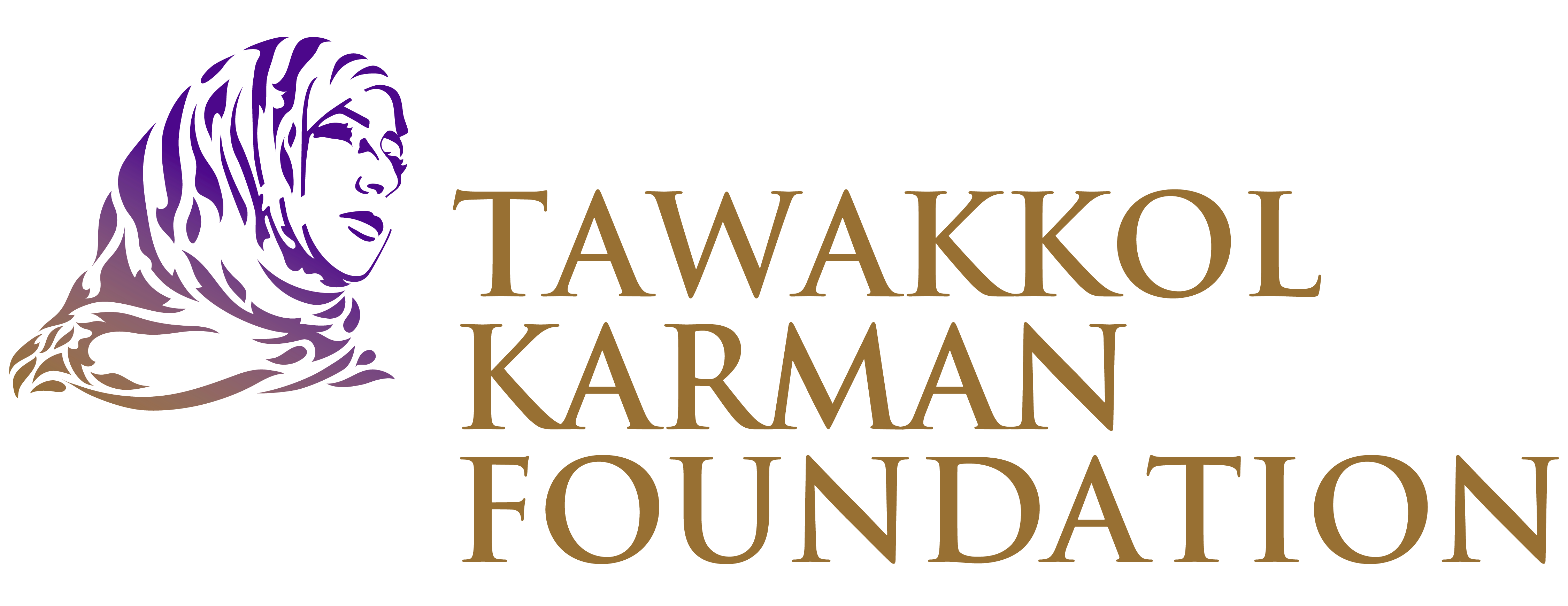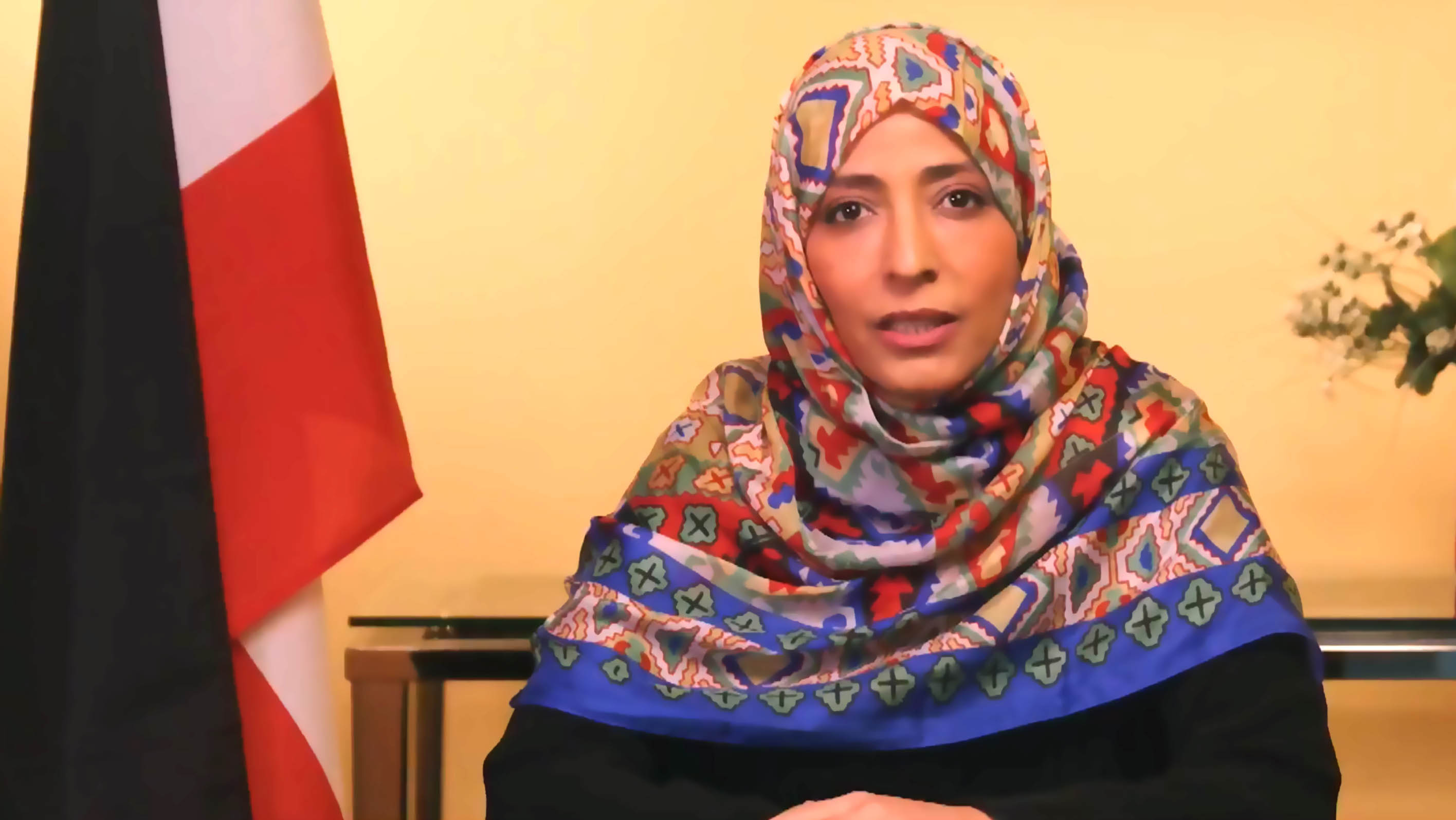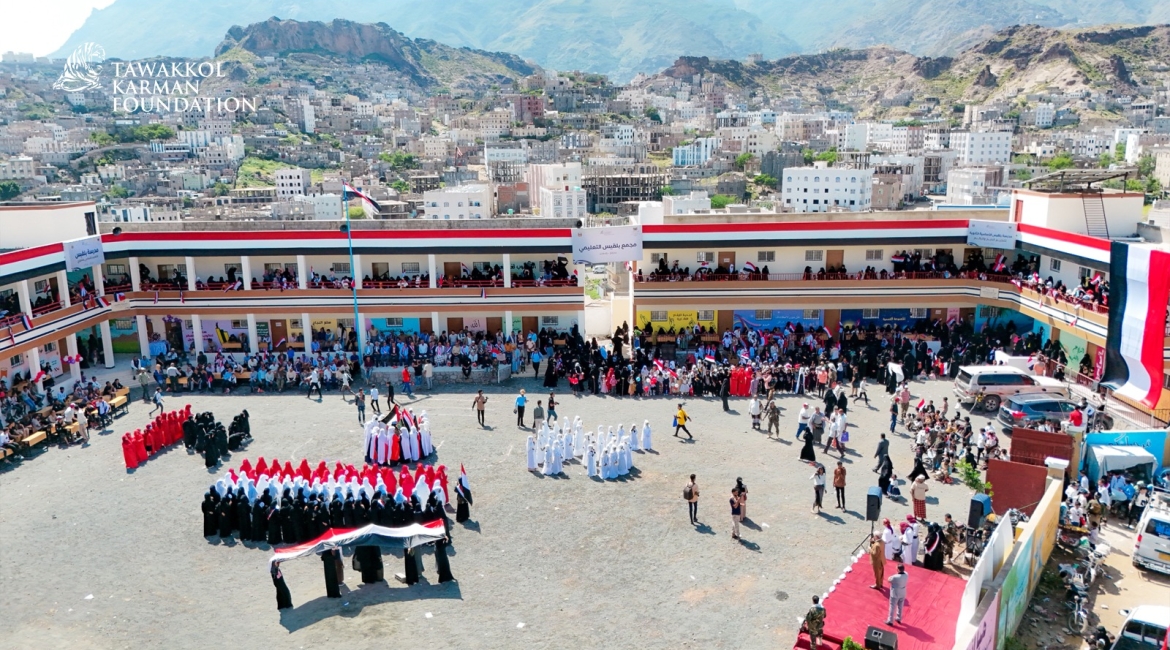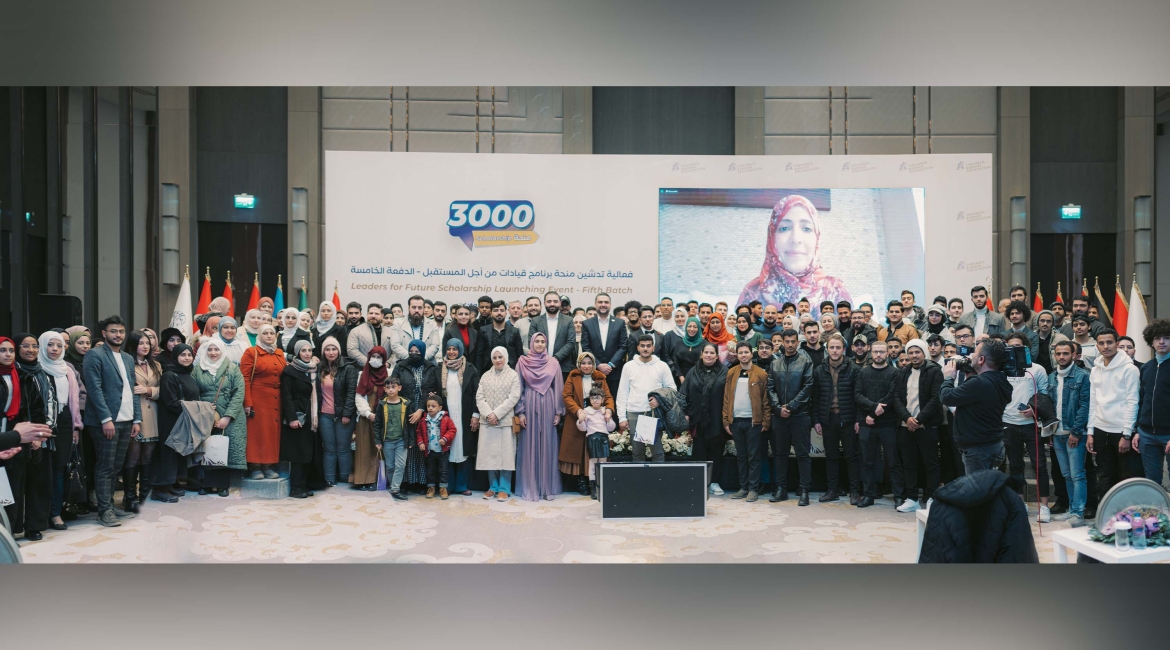Nobel Peace Prize laureate and human rights fighter, Tawakkol Karman, asserted that the sentiments expressed by opponents of the February Revolution
are tantamount to perpetuating the counter-revolutionary conflict and engaging in proxy warfare on behalf of foreign adversaries of Yemen.
Tawakkol Karman, in a speech commemorating the thirteenth anniversary of the peaceful February 11th revolution, stated that the alternative to the path of the February 11th revolution is the presence of sectarian and separatist militias, as well as foreign domination. She emphasized that the forces of oppression, injustice, and ignorance, both domestically and internationally, have targeted the February 11th revolution. Karman further stated that the warlords and their armed formations, affiliated with foreign powers hostile to the Yemeni people, are simply an extension of the previous regime.
Karman contended that the adversaries of the February 11th revolution are endeavoring to purge Yemen's collective consciousness of the fundamental principles and values it embodied, especially in the wake of a decade marked by their brutal and devastating conflicts. Stressing the importance of reinforcing the ideals set forth by the February revolution, she highlighted the disturbing trend of certain individuals distorting historical truths to mask their grave errors.
In her remarks, Karman held the power factions responsible for the fall of the country into the hands of a militia that embraces fascist ideologies, which contradict the legacy of the national movement in both the northern and southern regions of Yemen.
She pointed out that the major failure was caused by those who held positions of power, exerted influence within state institutions, and had an impact on conservatives and members of parliament. These individuals also held dominance within the military and security establishments.
Karman called on all those who witnessed the criminal coup to come forward and testify about the suspicious interventions that led to the collapse of the country. She emphasized that the Yemeni people will not surrender to those who seek to rewrite history using destruction and grudges as their tools.
She has voiced her concerns over the prevailing chaos in Yemen, attributing it to the backing of neighboring countries and the United Nations. In her statement, she underscores the imperative for any peace agreement to uphold the principles of national sovereignty, popular will, and justice. Karman reiterates her call for the establishment of an international court specifically dedicated to prosecuting both local and non-local perpetrators of war crimes.
Expressing her dismay at the unfolding developments in Yemen, the Red Sea, and the Israeli aggression against the Palestinian people, Karman vehemently condemns the airstrikes conducted by the United States, the United Kingdom, and Israel on Yemeni cities and territories. She urges the governments of Washington and London to take decisive action in bringing an end to the Israeli genocidal war in Gaza, asserting that such a step would contribute significantly to ensuring safe and unobstructed navigation through the Red Sea.
Karman further highlights the ongoing events in the Red Sea as a testament to the indispensable role of the Republic of Yemen in guaranteeing security for the Bab-el-Mandeb strait. Stressing the importance of respecting Yemen's fundamental principles and the nation's independence, she emphasizes that the stability of the region hinges on these crucial factors.
Karman underscored the essence of the Palestinian conflict as a struggle between a yearning for freedom and the establishment of an independent state on Palestinian land, juxtaposed with a harsh and oppressive occupation. She drew attention to the relentless nature of the Israeli occupation, which continues to perpetrate massacres against the Palestinian people, culminating in an ongoing genocidal war.
The activist firmly asserted that the rights of the Palestinian people are non-negotiable, emphasizing that recognizing and upholding these rights is the sole avenue towards achieving lasting peace in the region. Karman criticized Western nations for their disregard of Palestinian rights, deeming it both morally reprehensible and politically misguided, as it exacerbates the persistence of chaos and instability.
Regarding Yemen, Karman astutely observed that the maneuverability of the Houthi militia would not have been possible without the approach adopted by the Saudi-led coalition and its proxies. She confidently stated that the Houthi's position on Israel would neither deceive nor alter their steadfast support for their fellow Palestinian people, reaffirming their principled stance.
Karman underscored the inherent significance of endorsing the Palestinian people, framing it as a reflection of core values, national identity, religious obligations, moral imperatives, and humanitarian responsibilities. She shed light on the challenging circumstances faced by a determined population enduring occupation and unjust conflicts.
With a resolute tone, Karman voiced her unequivocal criticism of the position taken by Western nations concerning the aggression on Gaza. She found it paradoxical that these influential powers only seemed to acknowledge the Yemeni militia when it posed a potential threat to Israel's interests and maritime activities.
Here is the full speech transcript:
May peace, mercy, and blessings of God be upon you,
Greetings befitting Greater Yemen,
Greetings worthy of its soil grandeur, sacrifices of its children, and its great resilience in the face of formidable conspiracies,
Greetings of revolution and freedom to our great Yemeni people,
Greetings from the most significant event in our national history.
Greetings from the peaceful popular youth revolution, the glorious February 11th revolution, which stands tall in the face of a concerted effort by both domestic and international forces of oppression, injustice, and ignorance to distort its true essence because they recognize that it embodies the will and aspirations of our people for a dignified future and a better life.
Greetings to all my brothers and sisters on this glorious day, where our people have shown themselves to be a proud, noble, and determined nation, knowing what they want, raising their voices, and making sacrifices for freedom, dignity, and change. It is a day aimed at breaking free from the grip of a failed regime that has plunged Yemen into divisions, armed groups, and widespread destruction across all aspects of life.
The armed factions, led by warlords and supported by foreign adversaries, are but an extension of the former regime. Their primary objective today is to erase from Yemen's collective consciousness the noble principles and values championed by the illustrious February 11th revolution. This comes after a decade of relentless warfare that ravaged our nation's resources and tested the resilience of our people, whose peaceful youth-led revolution remains a shining beacon in Yemen's contemporary history.
Today, it is crucial to reflect on the significance of the trajectory laid out by the February Revolution, as there are deliberate attempts to distort history, in hopes of masking their catastrophic errors and misguided policies that culminated in a coup against Yemen's political transition process.
As you are aware, we were on the brink of a referendum regarding a new constitution for the nation, along with the prospect of conducting presidential and parliamentary elections. It is evident that the government established following the February Revolution presented an opportunity for political parties to forge a contemporary governance model.
However, what ensued was deeply disheartening. Those in positions of power became divided between conspirators and collaborators. Otherwise, how could the nation have succumbed so readily to the grip of a militia espousing fascist ideologies and embracing a political doctrine diametrically opposed to the legacy of the National Movement, both in the north and south?
This significant failure was instigated by those in positions of authority and influence within state institutions, exerting control over governors, members of the House of Representatives, and wielding influence within security and military establishments. The majority of Yemenis are aware and comprehend how this absurdity was orchestrated and how this criminal coup was promoted to the Yemeni people and the global community.
Today, I encourage all witnesses of that period and anyone with information about suspicious interventions leading to the country's collapse to step forward and share their knowledge. This is crucial for increasing our vigilance, confronting attempts to undermine our nation, stability, and lives, similar to the tragic consequences of the September 21, 2014 coup.
Knowledge is indeed power, and distorting the facts surrounding the February Revolution will not succeed. Cohesive and strong societies conduct comprehensive investigations to uncover the truth behind failures and hold responsible parties accountable. It is my hope and prayer that such an investigation will take place soon, providing Yemenis and people worldwide with valuable lessons and future immunity from similar experiences.
Indeed, we refuse to succumb to those who seek to rewrite history with the destructive ink of hatred. The opposition to the February Revolution today is nothing but a continuation of the counter-war against our people, serving as a proxy conflict for the enemies of our nation abroad. Our aspirations and goals remain clear and universal, shared by all free individuals on this planet. We seek to live in freedom and dignity, advocating for equality and justice in our homeland. We are partners in our nation, and we have neither oppressed others nor demanded what is not rightfully ours. This land belongs to us, Yemen is our birthright, and no one has the authority to claim ownership or monopoly over it.
Dear Yemeni people, both at home and abroad,
It's evident that only militias have thrived amidst this war, perpetrating violations against citizens and embezzling public funds. Previously, UN Security Council reports have labeled these militias as proxy forces, which is essentially a euphemism for "mercenaries." The primary dilemma we face today is that these militias are undermining state institutions under the guise of representing the state. Regrettably, this absurdity often occurs with the tacit support of neighboring countries and under the auspices of the United Nations. Therefore, any peace agreement in Yemen should adhere to the following three principles:
Principle One: Yemen, as a member of the United Nations, is entitled to full and unimpaired sovereignty. Consequently, any agreement must refrain from including provisions that contravene this principle or alter Yemen's political and legal status;
Principle Two: Legitimacy is derived from the people through free elections, not through the use of weapons or assertions of superiority, whether based on dynastic lineage or regional influence.
Principle Three: Any peace agreement cannot serve as a replacement for justice and its prerequisites. Those responsible for crimes and violations during this period must be held accountable. Continuing the policy of avoiding punishment would be perilous. Hence, I reaffirm the call for the establishment of a dedicated international court for Yemen, tasked with prosecuting both local and foreign perpetrators who have committed violations against Yemenis during the war. Justice is the entitlement of every Yemeni, and forgoing it would only embolden criminals to perpetrate more offenses. Those who believe they are immune from consequences often engage in improper behavior.
Dear Yemeni people, wherever you may be,
Yemen, along with the entire Arab region, is in dire need of genuine peace – peace that terminates the encroachment of dictatorships, eradicates the scourge of terrorism, and dismantles the influence of militias and armed factions that flourish amid conflicts and wars. We must bring an end to this destructive trajectory once and for all. Our region holds immense significance globally, but we must eliminate all impediments hindering our progress.
In the context of discussing peace in Yemen and the broader region, it is crucial to highlight the urgent and grave situation unfolding in Palestine, specifically in Gaza. The conflict in Palestine represents the aspirations of a people seeking freedom and their own independent state on their rightful land, while facing a harsh occupation that consistently commits massacres against the Palestinian population. The ongoing war of genocide, now in its fourth month, has reached unparalleled levels of brutality, leading to the destruction of Gaza's cities, displacement of its residents, and the loss of numerous Palestinian lives and injuries, with over one hundred thousand casualties.
Here, I underscore several key points:
Firstly, the Palestinians possess indisputable rights that cannot be subjected to negotiation. It is crucial for the promotion of peace and stability in the region to acknowledge and respect these rights. Doing so is essential for demonstrating that the world operates on principles of justice rather than chaos. The disregard shown by Western countries towards the rights of the Palestinian people, particularly regarding the establishment of their independent state with Jerusalem as its capital and the right of return, is viewed as both immoral and non-political. Such actions contribute to exacerbating instability in the region.
Secondly, the events unfolding in Gaza far surpass Israel's assertions of acting in self-defense. What is occurring constitutes war crimes and acts of genocide, as the entire world has witnessed the deliberate targeting of buildings, homes, civilians, schools, universities, places of worship, and hospitals. The decision by the International Court of Justice to assert jurisdiction over the lawsuit filed by South Africa, a country I salute for its legacy embodied by Mandela, is commendable. The occupier cannot simply pay lip service to the notion of self-defense; it is the people suffering under occupation who truly possess this right. Failing to recognize this principle would result in a world resembling a lawless jungle, endangering the progress made during the post-colonial era.
Thirdly, it is unjust and unfair to blame the Palestinians for the ongoing atrocities in Gaza. Moreover, regarding the conflict's history as commencing only on the seventh of last October is a flawed belief. This conflict is longstanding, with well-known underlying causes, including a settler occupation aimed at displacing the Palestinian people from their land. It is imperative, especially now that the world is increasingly acknowledging the reality of this conflict, that it be resolved in accordance with United Nations resolutions. Such resolution should guarantee the Palestinians' right to establish their independent state and uphold their historical rights.
Dear fellow Yemenis,
Recent events underscore a fundamental truth: there can be no security in the Red Sea without the presence of the Republic of Yemen, no security without honoring Yemen's principles, and no security without upholding the independence of the Yemeni state. Similarly, in the face of the Israeli war of genocide in Gaza and Palestine, there can be no security for the Red Sea or the broader region.
In the face of the Houthi rebels' militias, we must reiterate today that their continued strength and maneuverability would not have been possible without the Saudi-Emirati coalition and their tools in Yemen. The Houthi rebels' stance towards Israel will not deceive us into changing our principled position towards them. Our support for the Palestinian people remains steadfast and is based on values, nationalism, religion, ethics, and humanity. We stand with the free Palestinian people who have been subjected to occupation and face successive wars aimed at breaking their will and uprooting them from their land.
It is ironic that the major powers have only recently taken notice of the presence of militias in Yemen—specifically, the Houthi militia—when their actions began to directly impact their interests, as well as those of Israel, and the international shipping movement in Bab al-Mandab and the Red Sea. Prior to these events, Yemen's plight and suffering went largely unnoticed by these countries, as things were favorable for them.
Let's to make our position on this issue clear. We strongly condemn the attack on our country and denounce the savage airstrikes carried out by the United States and Britain on Yemeni cities and territories. It is crucial for America and Britain to take immediate action to halt the Israeli genocidal war in Gaza. This approach will effectively ensure the security of international shipping routes in the Red Sea without causing further suffering to the people of the region. It is important to remember that the disruption of navigation in the Red Sea serves as a reminder that supporting the Israeli genocidal war in Gaza and other places paves the way for widespread devastation.
The Yemeni people's stance on the Palestinian issue is genuine, longstanding, and deeply rooted. Therefore, no one should assume they can manipulate the situation in Gaza for their own selfish or narrow agendas. Therefore, it is crucial to remind Yemeni factions that their focus should not be on exploiting the plight of the Palestinian people, an issue on which all Yemenis agree, but rather on alleviating the suffering of their own people. This calls for prioritizing concessions for the benefit of Yemen. The present rulers have no legitimate claim or rightful authority over Yemen. Any assertion to the contrary is simply delusional, and they will ultimately face repercussions for these false claims. History consistently demonstrates that legitimacy stems from the backing of the people. Those who attempt to marginalize the people in decision-making will neither find resolution nor attain their objectives.
Let me remind you of a fundamental principle found in both Yemeni and global constitutions: that power ultimately resides with the people. They exercise this power directly through referendums and general elections, as well as indirectly through legislative, executive, and judicial bodies, and through elected local councils.
To address this matter comprehensively, I want to emphasize that Yemen stands as a unified and democratic republic, where the selection of its leader is determined by the will of the people. Under no circumstances can anyone dispute this fact. Any endeavors to establish a revised and distorted version of Yemen are tantamount to a war project that all Yemenis have the right to oppose and overthrow. It is crucial to underscore that deviating from the path of the February 11 revolution would only lead to the rise of sectarian and separatist militias, as well as foreign interference, which would perpetuate division and strife within Yemen.
Dear Yemeni people,
In our skies, ominous clouds loom—representing oppressive forces clinging to outdated notions of tyranny and domination, alongside occupying powers seeking to plunder Yemen and its resources. Yet, our allegiance to the principles of humanity, progress, and justice, as well as our collective aspirations for freedom and the rule of law, epitomized by the peaceful uprising of our youth and echoed in the legacies of past revolutions, namely the September 26th and the 14th revolutions, remains steadfast. Since October, these values have proven too resilient to be dispersed by fleeting clouds destined for dissolution.
In conclusion, I extend my salute to all individuals who actively participated in the February Revolution, as well as to those who initially held skeptical or opposing views but now stand in solidarity with a unified, republican-democratic Yemen. There is no solace for individuals who exploit change to monopolize power, who turn against the Republic for their own gain, or who compromise sovereignty to appease foreign interests. Our compass points to one direction: a unified Yemeni state, republican in system, ensuring political pluralism, safeguarding rights, protecting freedoms, and upholding the principles of equal citizenship and the rule of law.
Glory and honor to the youth of the peaceful popular revolution of February 11;
Glory and honor to the September 26th and October 14th revolutions.
Glory and honor to our great Yemeni people;
Glory and victory to the everlasting greatness of Yemen;
And peace be upon you, and may the mercy and blessings of Allah be upon you.




